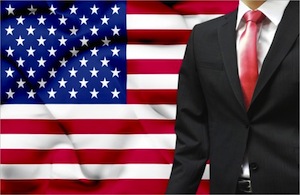 Certain people are more suited for freedom than others. As Jefferson taught, all of us are created equal and endowed by our Creator with inalienable rights.
Certain people are more suited for freedom than others. As Jefferson taught, all of us are created equal and endowed by our Creator with inalienable rights.
Still, all through history, eras of freedom are very rare.
The reason for this is historically clear: The people never stay free when they leave their freedom to any group of elites; they only remain free when a large number of the regular people understand freedom and take a stand to keep it.
Through all the records of human history, an interesting pattern shows what kinds of people are likely to do these things, to be and remain free.
The famous Scottish thinker John Millar wrote in 1787 that different “careers” and “lifestyles” create very different kind of citizens. He didn’t use these words, but this was his point.
In his words:
“The soldier, the clergyman, the lawyer, the physician, the tailor, the farmer, the smith, the shopkeeper are led, by the different objects in which they are conversant, to contract something peculiar in their behavior and turn of thinking.”
As a result, each career naturally tends to have different value to citizens.
Jefferson thought that farmers were the most important citizens, and Tocqueville said in Democracy in America that as attorneys go, so goes America’s freedom.
Later thinkers suggested that teachers are the most important — because they pass on, or fail to pass on, the principles of freedom to the next generation.
The reality is that different lifestyles tend to train people for different things, meaning that they have different values and skills. Some sets of values and skills are supportive of freedom, while others are not.
A deep understanding of freedom is necessary among the masses. Without it, freedom is lost. And the courage to stand up for freedom is also necessary among the regular people of a free society.
As Millar saw it, there are two kinds of courage:
“There is an active and a passive courage, which may be distinguished from each other, as they seem to depend upon different principles, and are not always to be found in the same persons.”
There are also two kinds of knowledge: a scholarly, deep, and often narrow expertise on the one hand, and a broad, widely-read, common-sense based wisdom on the other.
The active courage and broadly-read wisdom are those which lead to freedom in the nations of history. In contrast, passive courage usually ends up as endurance to the privations of authoritarian governments or castes, and narrow, scholarly expertise nearly always serves an upper class of elites in ruling over the masses.
A culture of active courage and widely-read common sense generally creates a society with the values and skills of widespread leadership, tenacity, ingenuity, initiative, innovation, creativity, independence, frugality, enterprise, the willingness to take risk, and a strange blend of flexibility and refusal to change.
These are often summed up under the term “entrepreneurialism.”
These are precisely the skills and values which are present in every society in history with a lasting era of freedom, including certain periods in Ancient Israel, the Golden Age of Athens, the Anglo-Saxon civilization, the Saracens, the Swiss vales period, the Frankish era, and the American founding.
These skills and values increasingly spread in the United States until about 1973.
In Millar’s outline of society, these values and skills were naturally strong among the small clergyman, independent lawyer and physician, independent tailor, farmer, smith and shopkeeper.
In contrast, those who tended to be employees of companies and organizations, rather than independent business owners, were weaker in these traits and more prone to the values and skills of fitting in to groups, following orders, building relationships that led to promotion, impressing those in authority, using debt to expand operations, aversion to personal risk, and strong allegiance to castes and hierarchies that tend to keep people in place.
Not everyone who is an owner excels in the first list of values and skills, just as not all employees are devoted to the second list.
But the trends are still strikingly consistent. Societies with more owners have significantly more freedom, and more people who are free.
Entrepreneurial societies naturally increase freedom, while the less entrepreneurial the society, the more freedom declines. This is sad news for America today, and good news for China.
Unless we get back to the freedom values and skills, we are going to lose our freedoms — no matter which candidates the people vote for or which party is in power.
The quickest way to restore American freedom is to resurrect the skills and values of entrepreneurialism.
As long as parents, teachers and young people focus on the goal of preparing the next generations to get good jobs (instead of to start and build good businesses), our decline is sure.
 Oliver DeMille is the New York Times, Wall Street Journal and USA Today bestselling co-author of LeaderShift: A Call for Americans to Finally Stand Up and Lead, the co-founder of the Center for Social Leadership, and a co-creator of TJEd.
Oliver DeMille is the New York Times, Wall Street Journal and USA Today bestselling co-author of LeaderShift: A Call for Americans to Finally Stand Up and Lead, the co-founder of the Center for Social Leadership, and a co-creator of TJEd.
Among many other works, he is the author of A Thomas Jefferson Education: Teaching a Generation of Leaders for the 21st Century, The Coming Aristocracy, and FreedomShift: 3 Choices to Reclaim America’s Destiny.
Oliver is dedicated to promoting freedom through leadership education. He and his wife Rachel are raising their eight children in Cedar City, Utah.






Speak Your Mind
You must be logged in to post a comment.